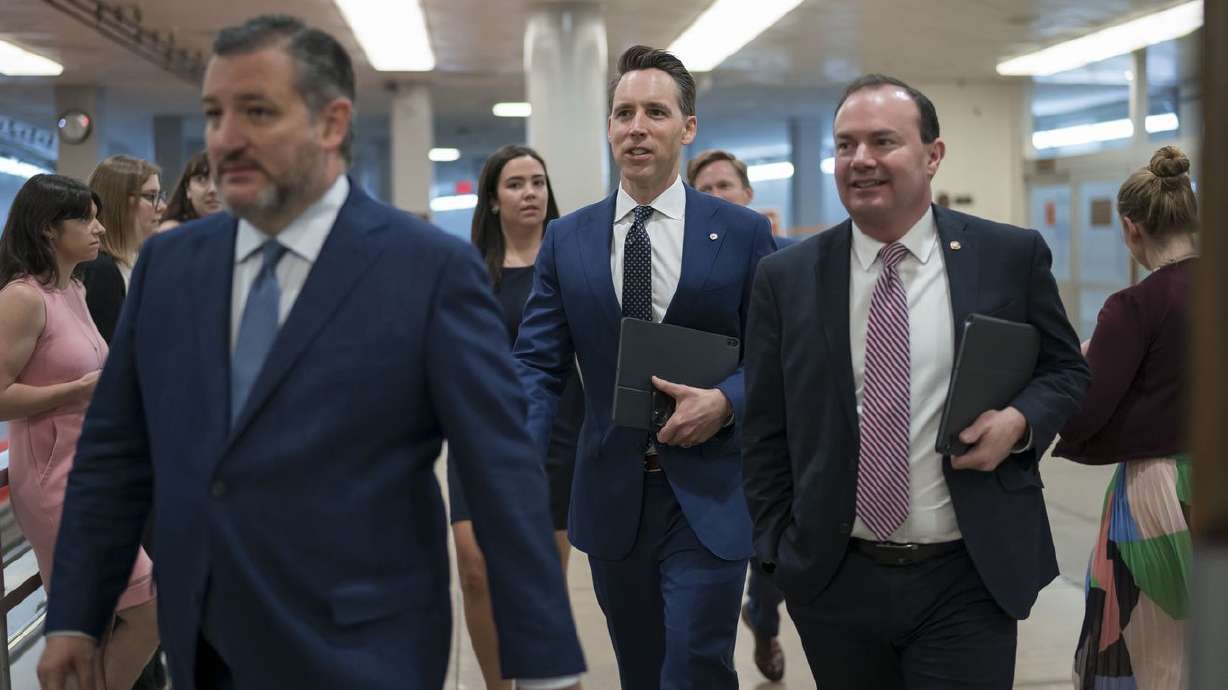Estimated read time: 3-4 minutes
This archived news story is available only for your personal, non-commercial use. Information in the story may be outdated or superseded by additional information. Reading or replaying the story in its archived form does not constitute a republication of the story.
WASHINGTON — Three conservative Senate Republicans, including Utah Sen. Mike Lee, filed an amicus brief Monday asking the U.S. Supreme Court to overturn its landmark ruling that allows abortion.
Lee and Sens. Josh Hawley, R-Mo., and Ted Cruz, R-Texas, argue in the 33-page brief that the status quo is "untenable." They asked the court to use a Mississippi case to be heard in its upcoming term to unwind Roe v. Wade and related abortion decisions.
"Where a legal doctrine has repeatedly failed to offer clarity — where it has proved unworkable in the past and will likely engender unpredictable consequences in the future — its existence constitutes an open invitation to judges to interpret it according to their own policy preferences, usurping the constitutional prerogatives of the legislature," the senators wrote.
"Roe and Casey should be overruled, and the question of abortion legislation should be returned to the states."
The 1973 Supreme Court ruling in Roe v. Wade legalized abortion nationwide. In 1992, the court upheld the constitutional right to have an abortion in Planned Parenthood v. Casey, but allowed states to regulate the practice to protect the health of the mother and the life of the fetus.
The filing comes after Mississippi Attorney General Lynn Fitch urged the court last week in a brief to overrule Roe when it takes up Mississippi's 2018 ban on nearly all abortions after 15 weeks of pregnancy.
The state petitioned the Supreme Court for a hearing after losing twice in the lower courts. In 2019, the 5th Circuit Court of Appeals held that Mississippi's restriction was an unconstitutional ban on a woman's right to terminate a pregnancy before fetal viability.
The Utah Legislature passed a law in 2019 banning abortion after 18 weeks gestation. A federal judge put the law on hold pending the outcome of litigation over similar laws in other states.
Planned Parenthood of Utah sued the state, arguing the ban is unconstitutional and that no fetus is viable at 18 weeks, and the ban is a violation of more than four decades of settled Supreme Court precedent.
Since that Supreme Court decision, no court has upheld a law banning abortion prior to viability, according to the lawsuit. The Utah bill originally set the limit for legal abortions at 15 weeks gestation, but it was revised to 18 weeks before the Republican-controlled Legislature passed it largely along party lines.
A 2018 poll of Utah voters found 44% support the ruling that legalized abortion, while 37% think it should be overturned, and 19% don't know what they want to see happen. The poll was conducted as the Senate considered the confirmation of Brett Kavanaugh to the Supreme Court, who was seen as a possible fifth and deciding vote to potentially overturn Roe v. Wade.
Lee, Hawley, and Cruz say in the court brief that while consideration of precedents might be important to the judicial process, they are not absolute.
"Where prior precedents are demonstrably unworkable, it is appropriate for the court to reconsider them," they wrote.
In Casey, the high court revised the test that courts use to scrutinize laws relating to abortion, creating the "undue burden" standard.
"An undue burden exists, and therefore a provision of law is invalid, if its purpose or effect is to place a substantial obstacle in the path of a woman seeking an abortion before the fetus attains viability," according to the ruling.
The senators argue that the test has proven "persistently unworkable" and produced inconsistent outcomes "lacking an intelligible principle." They say Casey does not represent long-settled doctrine and rests on a foundation of flawed judicial reasoning.









